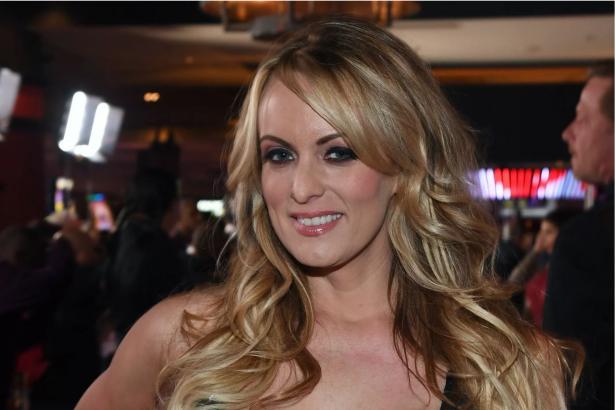Stormy Daniels wants to talk.
The porn actress, whose legal name is Stephanie Clifford, filed suit against President Trump in Los Angeles Superior Court on Tuesday, arguing that a nondisclosure agreement about their alleged affair is invalid because Trump never actually signed it. Under the agreement, apparently signed in October 2016, Daniels says she was paid $130,000 not to speak publicly about the alleged relationship.
As legal analyst Danny Cevallos explains at NBC News, Daniels isn’t suing for money. Instead, she wants the court to rule that the nondisclosure agreement is invalid or unenforceable, allowing her to speak freely about the relationship she says she had with Trump, without fear of litigation.
Trump’s team is fighting the suit, of course. But just by filing it, Daniels has managed to get a significant portion of her story into the public record. And the fact that she is going to court for the right to tell the rest is a reminder that in the era of #MeToo, it’s getting harder for powerful men to pay for women’s silence.
What Daniels is looking for in the suit is called “declaratory relief,” Cevallos writes — a finding that the nondisclosure agreement “was either never formed or that it is unenforceable.”
“Daniels’ objective is to have the court clear up whether this contract really forces her to remain quiet,” he explains. “That could be important if Daniels seeks to profit by telling her story about her alleged relationship with Trump.”
Her legal team’s central argument is that Trump never actually signed the contract — the space for his signature, under the pseudonym David Dennison, is left blank. “Mr. Trump purposely did not sign the agreement so he could later, if need be, publicly disavow any knowledge of the Hush Agreement,” Daniels’ suit alleges.
Trump’s lawyer Michael Cohen — the same one who claims to have paid the $130,000 out of his own pocket — appears to have signed the contract, and Trump’s team will probably argue that this is sufficient. But, Cevallos writes, the court may disagree.
Even if the court rules in Trump’s favor, Daniels has managed to make much of her side of the story public within the suit itself. Among her claims in the suit are the following:
- She affirms that she “began an intimate relationship with Mr. Trump in the Summer of 2006 in Lake Tahoe and continued her relationship with Mr. Trump well into the year 2007.” In January, she had issued a statement denying that the affair happened but later cast doubt on the statement’s validity.
- She says that Cohen forced her to sign the January statement through “intimidation and coercive tactics,” and that he has continued to try to intimidate her into silence. In late February, the suit alleges, Cohen “surreptitiously initiated a bogus arbitration proceeding” against Daniels in Los Angeles as a way of keeping her quiet.
- The suit argues that Trump has almost certainly been aware of Cohen’s efforts to keep Daniels quiet. Ethics rules for lawyers in New York would have “required Mr. Cohen at all times to promptly communicate all material information relating to the matter to Mr. Trump,” the suit says. “Accordingly, unless Mr. Cohen flagrantly violated his ethical obligations and the most basic rules governing his license to practice law,” the suit continues, “there can be no doubt that Mr. Trump at all times has been fully aware of the negotiations with Ms. Clifford.”
The last claim matters because if the $130,000 payment was coordinated with the Trump campaign, it could run afoul of campaign finance laws. And if Trump knew about the payment, voters would have to contend with the fact that their president authorized the payment of hush money that could have ensured his election.
The suit also includes a copy of what Daniels’s team says is the nondisclosure agreement she signed.
Daniels has not alleged any sexual harassment or assault by Trump, and her story is not a #MeToo story as such. But her suit offers a clear and detailed picture, down to the nondisclosure agreement itself, of what she says has been a months-long campaign by Trump’s legal team to keep her quiet.
Her story is similar to that of Karen McDougal, who says she had an affair with Trump and then signed away the rights to the story to American Media Inc., the company that owns the National Enquirer. AMI apparently buried the story, Ronan Farrow reported at the New Yorker, possibly in an effort to protect or control Trump. McDougal spoke out, she says, in part to warn others to think twice before signing nondisclosure agreements. “Every girl who speaks is paving the way for another,” she told Farrow.
It’s not clear that Daniels has such a goal, and she may well be motivated, at least in part, by the desire to sell her story. Still, her suit is a reminder that what worked for powerful men in the past — ensuring women’s silence with money and intimidation — may not work as well now that those tactics are out in the open.
Anna North is Senior Reporter at Vox. I cover gender issues: reproductive rights, workplace discrimination, LGBTQ rights, masculinity, femininity, and more. I came to Vox from the New York Times, where I held several positions, including member of the editorial board. I'm also the author of two novels, America Pacifica (2011) and The Life and Death of Sophie Stark (2015). RSS.


Spread the word